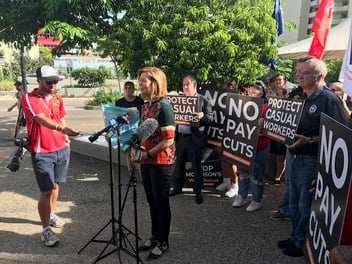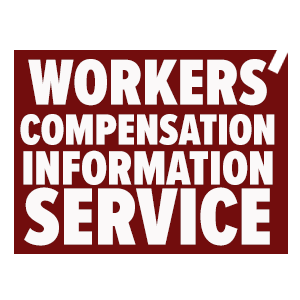Valley action highlights Harvey’s millions while workers face pay cuts
Workers take to Brisbane streets today to protest JobKeeper corporate welfare propping up rich-lister bank accounts while workers are left to languish as wages fall behind the cost of living.
Rallies are planned across the state outside Brisbane, Townsville and Cairns outlets of retail superstore Harvey Norman and subsidiaries, which made a 116 per cent profit over the year as well as pocketing a $22 million Jobkeeper subsidy from the taxpayer during the COVID pandemic. Similar actions are underway in locations around the country.
Gerry Harvey, owner of Harvey Norman, gloated last year of increasing profits and turnover but has lined up behind his National Retail Association calling on the Fair Work Commission to freeze workers’ wages in the upcoming minimum wage case.
Mr Harvey, who the Australian Financial Review ranked 31st richest person in Australia in 2020 with a personal wealth of $2.57 billion, says he will not pay back the JobKeeper subsidy.
Queensland Council of Unions General Secretary Michael Clifford said Harvey Norman’s stance was a slap in the face to workers in Queensland. This state had 728,500 workers on Jobkeeper from July to September 2020, at the same time as the retail superstore was racking up its huge profit.
Across Queensland, holiday hotspots including the Gold Coast and the tropical north were among the most exposed to the end of JobKeeper.
Employer groups – such as the National Retail Association – representing some of the biggest companies in Australia are now arguing that there should be no minimum wage increase at all this year or that any increase should be delayed.
The Morrison government has also warned against significant minimum wage increases being granted to 2.2 million low-paid workers.
The quickening labour market recovery – more than 940,000 jobs have added over the past year — has failed to spark wages growth, and inflation is forecast to outstrip wage rises in the next few years.
Mr Clifford said any outcome that results in a below inflation wages increase is not a pay freeze but a real pay cut.
“It would be deeply unfair and bad for the economy to effectively cut the pay of the low-paid workers who kept our economy going during this crisis – our cleaners, supermarket workers and delivery workers, our health and aged care workers.
“This problem has become worse with the largest surge of insecure jobs in our nation’s history in the last six months,” he said.
“Job insecurity feeds low wage growth. The budget assumes consumer spending will increase, but how will it increase if wages go backwards?
“The recovery – such as it is – is being driven by consumer spending, which is unsustainable without wage rises and more job security for working people. The Morrison Government can act immediately to address both these issues,” he said.
The annual wage review directly determines wage increases for around 25 per cent of the workforce. The federal government should be arguing alongside unions for wage increases. If they did so it would make a huge difference, he said.
“Perhaps they are more concerned with upsetting their friends in big business like Gerry Harvey who are putting their energies into arguing for pay cuts and wage freezes,” Mr Clifford said. “We need a recovery which provides for the working people who carried us through the pandemic.”


